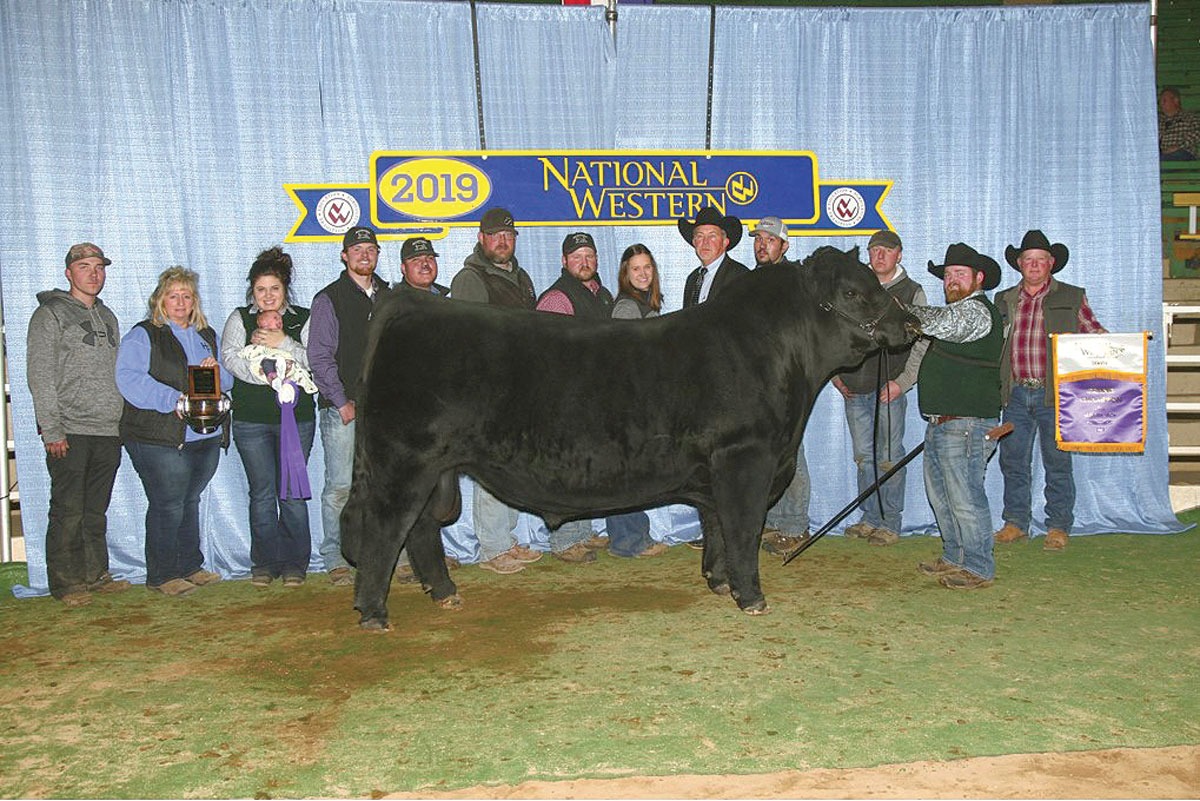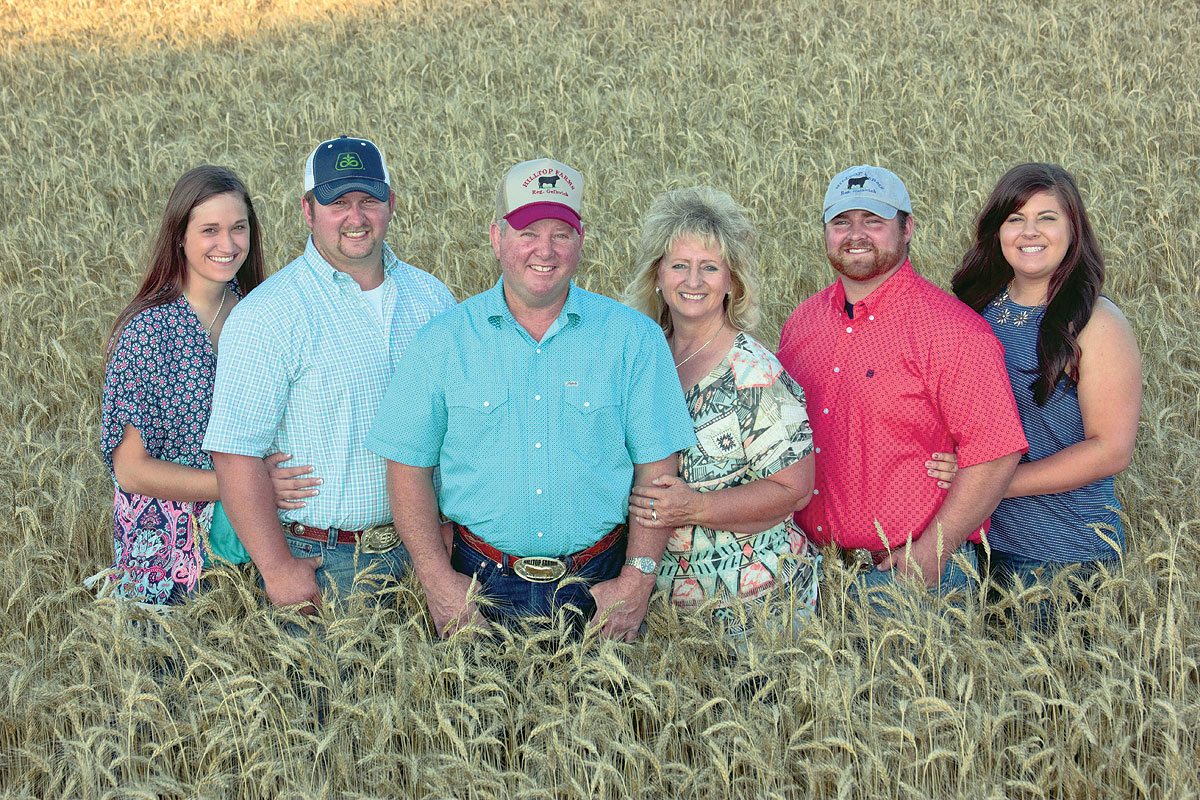
Hilltop Farms and the McWilliams family say the years of hard work finally pay off
Just how do legacies begin? Are they a myth that grows over time from someone’s imagination or do they evolve slowly from the labors of men who have a vision of perfection?
Before a legacy can take root and grow, it is cultivated, groomed, costs weighed, and sweat equity applied for years before the vision becomes a reality. And no one understands this more than the Elmer McWilliams family, of Hilltop Farms near Asbury, Mo. Their farm-raised Gelbvieh bull, Mr. Equalizer, recenlty won the National Western Stock Show Grand Champion Gelbvieh Bull.
With humble beginnings, Warren and Geraldine McWilliams, Elmer’s parents, bought the farm in 1960, working the 400 acres and running a dairy until 1968 when Warren started breeding the Holsteins with a black Angus bull, beginning a small beef operation along with their crops.
After his parents passed away, Elmer wanted to move back to the home place and continue farming with his sons. He and wife, Brenda, bought his sister’s share of the property and moved there in 2016.
Brad, the eldest son, and wife Katie are expecting their first baby in May. Youngest son, Benny and wife Sarah just welcomed a daughter, Taegan.
Benny, ag teacher at Diamond, Mo. high school, admits the majority of his education came from the farm and some hands-on work at the Missouri State University’s cattle ranch.
“We always did what Dad did,” Brad adds. “I grew up playing with toy tractors and cows.”
The family has a strong background in FFA, in fact, all three men have been FFA chapter presidents during high school. Elmer credits his experiences in FFA as planting the idea of raising beef cattle.
“I watched my sister show in FFA and knew that is what I wanted to do myself,” Elmer said.
His first animal was a yearling Hereford heifer he bought for $350 at the annual Hereford Association sale in Jasper, Mo. back in the 70s when he was in middle school.
“I was in the Polled Hereford business clear up until 1984,” he said.
What hooked him on Gelbvieh was watching his father-in-law’s herd, sired by a red Gelbvieh bull and how they grew off calves and how docile they were. When his father-in-law offered the bull to him, he accepted. The year was 2000.
“After the first crop of calves off that bull, I was so impressed the next thing I knew I was going to Gelbvieh sales buying cows,” Elmer recalled.
The Gelbvieh, a German breed, known for their maternal traits, wean off a big calf despite their own size.
“You can easily put 40 or 50 pounds on a calf at weaning just by crossing a Gelbvieh with an Angus,” Elmer adds.
Gelbvieh are known for longevity and efficiency and when bred with Angus, one can expect an average four-pound gain daily when fed out, dressing out at 90 percent choice grade or better.
“I talked to my brother-in-law when I got into this Gelbvieh thing,” Elmer recalled. “I said I’d like to raise the grand champion Gelbvieh bull but figured I could never compete with the folks that have a lot of money and years behind them.”
It was a goal he set from the beginning thinking it was just a wild dream.
“When calves are hitting the ground and out of 100 or so calves you have to spot the two or three that will make a good show animal, that is the hard part,” Benny states.
They have been selling seedstock cattle for 12 years, but their herd really took off when Brad and Benny were still showing cattle at the high school level.
“We’ve had a few champions,” Benny adds. “With each animal we’re stepping through a new doorway.”
The dining room table is the genetics research station with Elmer as the head researcher. Breed magazines, flyers and sale bills cover the table next to the Grand Champion bowl won in Denver. Improving their herd is more than just research in publications, as Benny points out.
“We go to shows and sales, paying attention to the good cattle, taking note of the bloodlines and where they came from, focusing on the best genetics.” Benny remarks.
Elmer is quick to recognize the success with the cattle is a mutual effort among the family and a couple neighbor boys who help with working the show cows.
Like most typical family farms, cattle are not the only thing produced on the farm. They also raise corn, soybeans and wheat, as well as, native prairie grass and Bermuda on around 2,500 acres. Brad primarily focuses on the crops and running the newer equipment. Wife, Katie, often runs the grain cart, helps with haying and enjoys working the cattle.
“Each of us has a role to play in the farming operation,” Brenda, who primarily works the ground, said
Additionally, Brad and Elmer handle the feed grinding, feeding the herd and monitoring cows in calving season. They all agree that Benny and Sarah have the patience for the halter training and grooming required to show the cattle.
There were tears, coupled with various emotions that went beyond the huge win. The success in the ring validated all their hard work, hours of research, spotting that special animal and then spending countless hours working with it.
“You don’t win shows at that show,” Benny said. “You win them at home where all the hard work happens.”
The end goal for the McWilliams is not cattle that look good in the ring but being deliberate with each breeding program decision, resulting in a quality production animal.
“Our motto has always been to raise quality seed stock,” Elmer adds. “We believe this champion bull is a breed changer.”
The whole process did not just emerge one day… it started with those simple but deliberate lessons taught by Warren and Geraldine, passed down to Elmer and then to Brad and Benny. That is how a true legacy begins.







